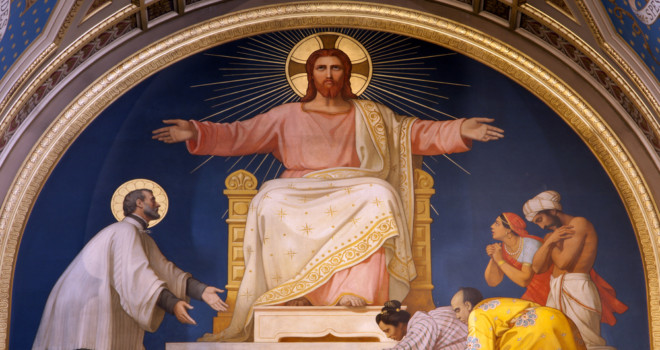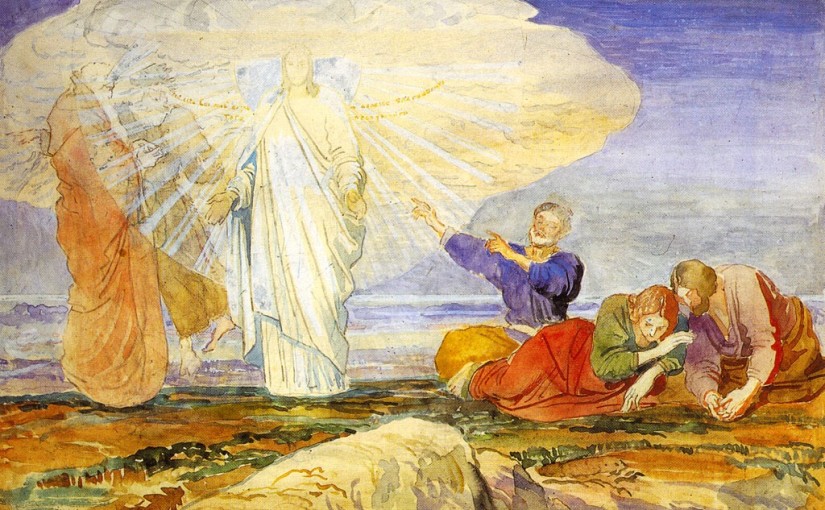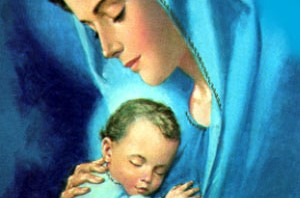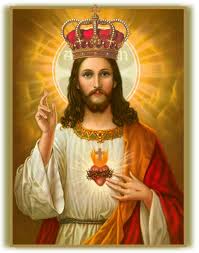Today we celebrate the great feast of Our Lord Jesus Christ the King of the Universe. It’s one of those feasts that I think we can say, yeah, okay, I believe that. But it really doesn’t affect me. I mean, we don’t even have the political reference of being ruled by a king any more. Not only that, I think we as a society have pretty much bracketed the whole idea of authority. Basically if an authority gives us permission to do whatever we want, then fine, he or she can be in authority. But the minute that authority tries to limit us in any way, then whoa: hang on a minute.
Yet there are times when we do want an authority. Whenever we are wronged, we want an authority to give us justice. Whenever we are in danger, we want an authority to keep us safe. Whenever we are in need, we want an authority to bring us fulfillment. But other than when we need something, we hardly ever seek any kind of authority. Certainly not as a society, and if we’re being honest, not as individuals. As an example, take the days after the tragedy of 9-11. Our whole world was shattered. I wasn’t here then, but I would be willing to bet the church was filled to overflowing; I know my home parish was. In those days, we wanted an authority to bring us peace and comfort and rest. But now that we’re seventeen years on the other side of it, look around. Not so many people in the pews, right? If Christ was the authority then, what makes him less of an authority now? We certainly did not come through those harrowing days with our own feeble efforts, but when we don’t have buildings crashing down around us, we don’t seem to remember that.
Still, the Church gives us this important feast of Our Lord Jesus Christ the King of the Universe to remind us that there is an authority. Christ is King in good times and in bad, in sickness and in health. Christ is king of the Universe and king of our own lives. And if that’s true, we have to be ready to live that way. So no, we can’t just do whatever we want. And no, just because we believe something with all our hearts, that doesn’t make it truth. And no, the idea of living according to our conscience doesn’t mean that it’s okay as long as it works for me. The world would have us believe that, but the world will one day come to an end. If we want the possibility of eternity, then we have to be open to the authority of Our Lord Jesus Christ, the King of the Universe!
In today’s first reading, we have the promise of the king: one like a son of man with an everlasting dominion. This part of the book of Daniel comes from a series of visions. In these visions, particularly the one we have today, Daniel gives the Jews hope in persecution. This is a vision that is spoken to lift the people up and help them to know that their hope is in God. The Jews of his day have been being persecuted by the Greek tyrant, Antiochus Epiphanes IV. He and his henchmen were certainly persecuting the Jews who insisted on living the Jewish way of life. But what is even more evil and more disastrous to the community, is that some of the Jews were starting to think that giving up their way of life and instead worshiping the gods of the Greeks was a good idea. They figured if you can’t beat ‘em, join ‘em. So, why not give up their own faith to follow one that seems to be working better? The biggest danger they faced was losing their faith to the pagans by adopting pagan ways of life.
We clearly are not under the persecution of Antiochus Epiphanes, but we are definitely in danger of losing our faith to the pagan forces of this world. And there are so many seductive ways that pagan forces weasel their way into our lives and tempt us to give in to their power over us. Relativism and intolerance for Catholic values seem to be winning more souls every day. Everything that promises us power, success and wealth has the ability to take our hearts and souls with it. Why not just give in? Won’t paganism and evil win out in the end?
Well, Daniel sure didn’t think so. He prophesied that there would be one like a Son of Man who would triumph over Antiochus and others like him. This One would deliver them from the persecution they suffered and from the seduction that confronted them. This One would rule the world in justice and peace, and would lead the persecuted ones to a kingdom that would never pass away.
The early Church identified this Son of Man with Jesus Christ. He is the One who has power to rule over all and he is the One whose kingdom is everlasting. He even referred to himself as the Son of Man, and made it clear that he was the Son of Man who would suffer for the people. He came to deliver those first Christians from persecution with the promise that he would indeed come again, and that same promise is made to us as well.
But the problem was, he didn’t return right away. People lost faith, gave in to persecution, and just went with the powerful forces of the day. The delay in his return led some to believe that he was not returning, and so they should just do what seemed expedient. Why not go with the victorious pagan forces of the world? Sounds pretty familiar, doesn’t it?
Jesus told Pilate in today’s Gospel that his Kingdom was not of this world. That should be the red flag for us. When we begin to worship and follow the forces of this world, we know that we are in the wrong place. The preface to the Eucharistic Prayer, which I will sing in a few minutes, tells us the kind of kingdom that Christ came to bring and we should long for is a kingdom like this:
…an eternal and universal kingdom
a kingdom of truth and life,
a kingdom of holiness and grace,
a kingdom of justice, love and peace.
Christ is the King, the Son of Man, who will lead us to a kingdom not made by human hands, a kingdom that will not pass away, a kingdom of eternal beauty and unfathomable joy. The choice is ours, though. Will we follow the pagan forces of this world, or will we follow Our Lord Jesus Christ the King to that perfect and everlasting kingdom, not of this world that will certainly pass away, but the kingdom of eternity and the life of heaven?





You must be logged in to post a comment.